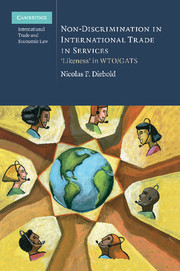Book contents
- Frontmatter
- Contents
- Foreword
- Acknowledgements
- Abbreviations
- List of Cases
- List of Legal Texts
- List of Documents
- Introduction
- PART I Foundations
- PART II Framing the conceptual breadth of ‘likeness’ in GATS
- PART III GATS specific ‘likeness’ issues
- PART IV Methodology for the ‘likeness’ analysis in GATS
- Bibliography
- Index
Foreword
Published online by Cambridge University Press: 10 January 2011
- Frontmatter
- Contents
- Foreword
- Acknowledgements
- Abbreviations
- List of Cases
- List of Legal Texts
- List of Documents
- Introduction
- PART I Foundations
- PART II Framing the conceptual breadth of ‘likeness’ in GATS
- PART III GATS specific ‘likeness’ issues
- PART IV Methodology for the ‘likeness’ analysis in GATS
- Bibliography
- Index
Summary
The scope and definition of like products has always been at the heart of World Trade Organization (WTO) jurisprudence relating to Articles I and III of the General Agreement on Tariffs and Trade (GATT). It is the core of the fundamental principle of national treatment and its practical operation in international trade regulation. The General Agreement on Trade in Services (GATS) is built upon the same foundations, albeit, national treatment assumes a fundamentally different role of allowing for progressive liberalization. Accordingly, the role and function of likeness is not necessarily the same as in the field of goods. There are differences in the treaty texts. Moreover, and unlike GATT, dispute settlement has not brought about further clarification of the subject. The legal development in the field, some 15 years after the adoption of the new Agreement, is still in its infant stage.
The present book analyses the problem of likeness in the context of services in great depth, based upon the findings in GATT, and further developing the field in light of insights gained in the field of competition law. The different structure of services – short of physical properties and the absence of border measures – requires a new and fresh approach in addressing the goal of securing equal and fair conditions of competition for imported services. The author builds upon insights that the problem should, in the field of services, be addressed mainly in terms of substitution of demand, and that the analysis can be largely based on respective criteria developed in domestic competition law.
- Type
- Chapter
- Information
- Non-Discrimination in International Trade in Services‘Likeness' in WTO/GATS, pp. xvii - xviiiPublisher: Cambridge University PressPrint publication year: 2010



